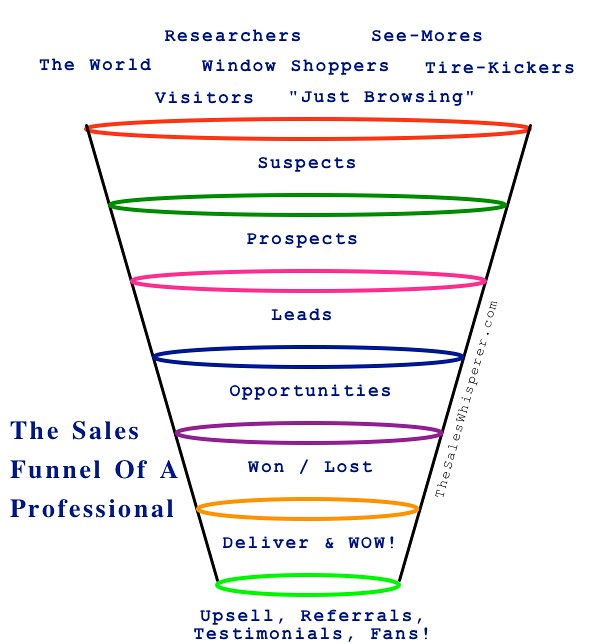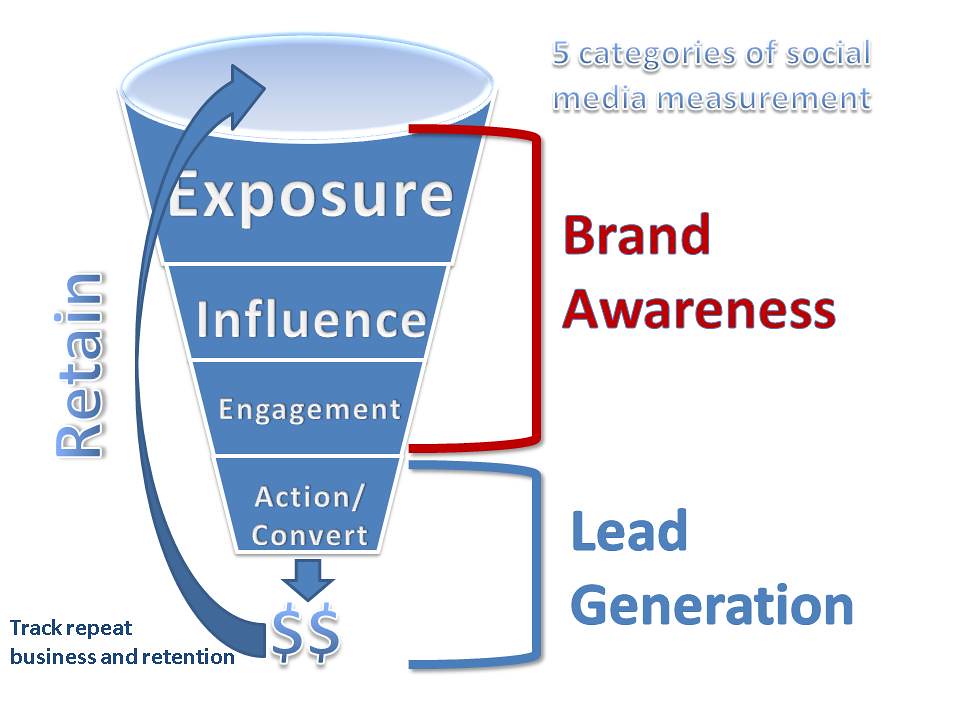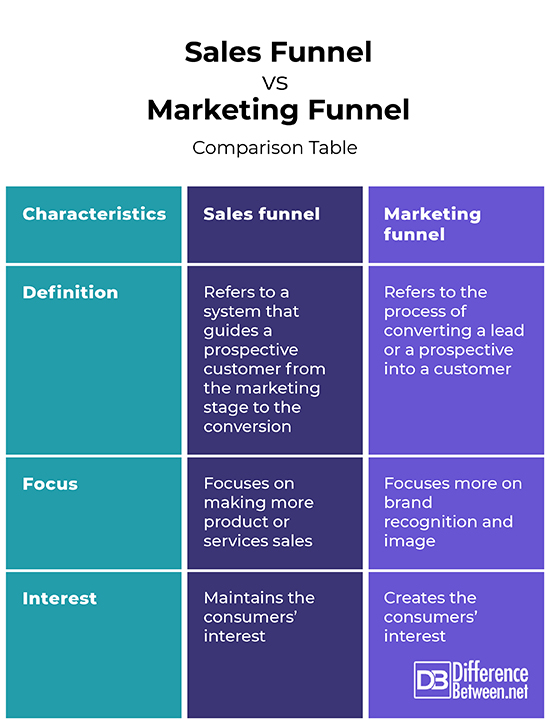Difference Between Sales Funnel and Marketing Funnel
Profitability remains a necessity not only for business continuity but also for survival. As such, businesses must engage in aggressive activities that will lead to sales conversions. Sales and marketing are two commonly used methods to generate sales. In most businesses, sales and marketing are two separate departments, with different processes, procedures and goals. There however remain blurred lines between the two as they are closely identical terms in the business environment. These terms become more complicated by the mention of their respective funnel, or rather the experience of a customer from being a prospect to a buyer. Is there a difference between a sales funnel and a marketing funnel? Let’s take a look.

What is a Sales Funnel?
This is a system that guides a prospective customer from the marketing stage to the conversion. Although business models differ, sales automation tools that automatically transition the prospect through various sales stages have become common, hence ensuring prospective sales are not easily lost. However, for a sales funnel to be effective and give the desired results, it should be consistent and interlink between one process to the other as each sales stage has an impact on consumer behaviour.
Advantages of a sales funnel include;
- Boost sales by inspiring trust
- Sales funnels are able to identify problem areas in a sales process and allow for the necessary correction measures
- They enhance the automation of the sales process.
The four sales funnel stages include;
- Awareness- This is the moment to catch a prospective buyer’s attention. It could be through a poster, an email, an online ad or even a Google search.
- Interest- At this stage, the prospects research a product and compare it with other options.
- Decision- This is the stage at which the consumer is ready to make a purchase. This is the best stage at which brands should make offers such as discount codes or free shipping such that it’s irresistible to a consumer.
- Action- This is the stage at which a customer makes a purchase. Although it’s the last stage in the funnel, brands should focus on customer retention by offering incentives such as after-sale services.
The right sales funnel should;
- Capture enough targeted consumers
- Gain enough trust from the prospective customers to a point of sharing contact information
- Make sales through the sales efforts
- Ensure customers return for more sales

What is a Marketing Funnel?
This refers to the process of converting a lead or a prospective into a customer. This not only helps prospects get to know a brand but also enables businesses to visualize their customers’ journey, hence come up with an effective marketing support strategy.
The marketing funnel is divided into:
- Lead generation- This includes activities primarily meant to showcase or create awareness around a brand. Some lead generation activities include; viral campaigns, inbound marketing, trade shows, content marketing and online ads.
- Lead nurturing- This is the next step after lead generation. Nurturing a lead creates a thriving relationship between a prospect and a brand.
The stages of a marketing funnel include;
- Awareness- This is the lead generation stage. Consumer reach is intensified through consumer research followed by marketing campaigns. At this stage, brands engage in direct mail, social media ads, events, webinars and viral campaigns, just to name a few.
- Interest- This step involves giving information on the company, product and other helpful information. This is the best stage for brands to establish a relationship with the leads.
- Consideration- Prospects can receive more information about a product through channels such as automated emails.
- Intent- This stage is for prospects who have displayed an interest in purchasing a product through a survey or when a prospect places a product in a shopping cart on an e-commerce website.
- Evaluation- Here, prospects are making the decision on whether to purchase a service or product or not. Both marketing and sales departments work together to convince the consumer that the service or product is the best choice.
- Purchase- This is the final stage in the funnel after a prospect has purchased a service or product.
Similarities between Sales funnel and Marketing funnel
- Both help businesses visualize their customers’ journey
- Both aim at maximizing sales through brand recognition or product recognition
- Both obtain tactics, processes, strategies and tools to optimize each stage
Differences between Sales funnel and Marketing funnel
Definition
The sales funnel refers to a system that guides a prospective customer from the marketing stage to the conversion. On the other hand, the marketing funnel refers to the process of converting a lead or a prospective into a customer.
Focus
While the sales funnel focuses on making more product or services sales, the marketing funnel focuses more on brand recognition and image.
Interest
While the sales funnel maintains the consumers’ interest, the marketing funnel creates the consumers’ interest.
Sales funnel vs. Marketing funnel: Comparison Table

Summary of Sales funnel vs. Marketing funnel
The sales funnel refers to a system that guides a prospective customer from the marketing stage to the conversion. It focuses on making more product or services sales. On the other hand, the marketing funnel refers to the process of converting a lead or a prospective into a customer and focuses more on brand recognition and image. Despite the differences, both work together to attract and main a consumer.
- Difference Between Profit Center and Investment Center - July 2, 2022
- Difference Between Anti-Trust and Anti-Competition - June 6, 2022
- Difference Between Stocktaking and Stock Control - June 6, 2022
Search DifferenceBetween.net :
1 Comment
Leave a Response
References :
[0]Image rcedit: https://live.staticflickr.com/5595/14328591468_cb1c94c089_b.jpg
[1]Image credit: https://live.staticflickr.com/4148/5071174683_9a38194a08_b.jpg
[2]Adrian Davis. Human to Human Selling: How to Sell Real and Lasting Value in an Increasingly Digital and Fast-Paced World. Morgan James Publishing, 2014. https://books.google.co.ke/books?id=WMWLAwAAQBAJ&pg=PA21&dq=Difference+between+Sales+funnel+and+Marketing+funnel&hl=en&sa=X&ved=0ahUKEwiN9J-A4vzoAhUKlxQKHdNVBRw4ChDoAQgzMAI#v=onepage&q=Difference%20between%20Sales%20funnel%20and%20Marketing%20funnel&f=false
[3]Jeff Sauro. Customer Analytics For Dummies. John Wiley & Sons Publishers, 2015. https://books.google.co.ke/books?id=R1MqBgAAQBAJ&printsec=frontcover&dq=Difference+between+Sales+funnel+and+Marketing+funnel&hl=en&sa=X&ved=0ahUKEwi719ju4fzoAhVGDWMBHTe4CwoQ6AEIZTAI#v=onepage&q=Difference%20between%20Sales%20funnel%20and%20Marketing%20funnel&f=false
[4]Dayna Rothman. Lead Generation For Dummies. John Wiley & Sons Publishers, 2014. https://books.google.co.ke/books?id=CTcKAwAAQBAJ&printsec=frontcover&dq=Difference+between+Sales+funnel+and+Marketing+funnel&hl=en&sa=X&ved=0ahUKEwiN9J-A4vzoAhUKlxQKHdNVBRw4ChDoAQhdMAc#v=onepage&q=Difference%20between%20Sales%20funnel%20and%20Marketing%20funnel&f=false

Thanks bro, for valuable information